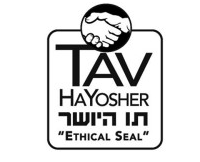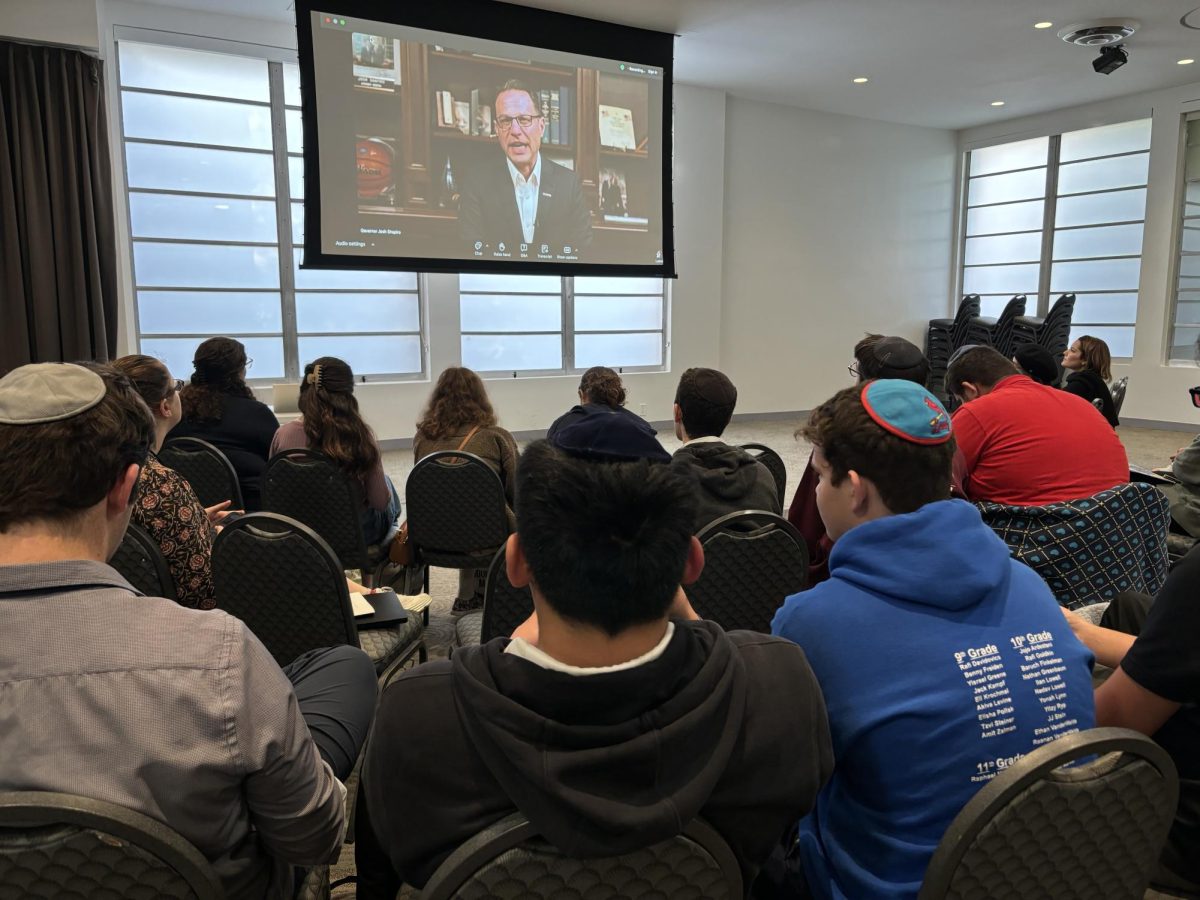
Ask a typical Jew about Judaism’s requirements for food, and you’ll probably get a simple answer: “All my food needs to have is a hechsher. Kosher is kosher, right?” What they don’t realize is that this notion is, in fact, wrong. Kosher might be kosher, but kosher is not always yosher (coming from the root yashar, meaning right, or ethical). Unfortunately, food that might be prepared according to the halachot of kashrut often directly violates the crucial ethical and Jewish principle of fair treatment of workers.
In the hopes of correcting this flaw in the restaurant industry, Uri L’Tzedek, an Orthodox Jewish social justice movement, has created the Tav HaYosher, an ethical seal that restaurants can receive when they agree to adhere to three simple standards: the right to fair pay, the right to fair time, and the right to a safe work environment.
These three expectations are each theoretically guaranteed under federal law. Uri L’Tzedek’s website, www.utzedek.org/tavhayosher, details the legal backing behind these three basic rights: “The Right to Fair Pay: All employees must be paid at least the minimum wage as defined by state law… The Right to Fair Time: Wageworkers must, by law, be paid time and a half for any hours over 40 they work in a week, and have one day off a week… The Right to a Safe Work Environment: It is illegal for a restaurant to discriminate based on race, color, religion, language, sex, pregnancy, age, disability, sexual orientation, alienage or citizenship status. Employees have the right to a safe, clean, orderly, and sanitary workplace…”. The website goes on to describe basic expectations within the workplace.
The legal protections afforded to every employee under the Fair Labor Standards Act (FLSA) theoretically ensure that every employee receives these three things. Any violation of the FLSA can legally result in criminal sanctions, including jail time. Unfortunately, though, the government does not have enough inspectors checking restaurants to make sure these standards are being abided by. Uri L’Tzedek’s mission is to help kosher restaurants follow these basic U.S. laws, under the premise that treating workers well is an essential aspect of Judaism, and one well worth fighting for.
The Tav HaYosher (loosely based on Israel’s Tav Chevrati) came about as a reaction to a scandal in 2008 which revolved around Agriprocessors, a kosher meatpacking plant in Iowa which had been one of the largest in the country. An immigrant raid from the government uncovered horrifying truths, such as that they were employing children to work in extremely dangerous areas, shaving money off each worker’s paycheck every month, and employing and exploiting illegal immigrants.
The two co-founders of Uri L’Tzedek, Rabbi Shmuly Yanklowitz and Rabbi Ari Hart, came together and essentially acknowledged how ludicrous it was that they were eating this food. They realized that this was not a company they wanted to support or food they wanted to eat. However, rather than trekking out to slaughterhouses in the Midwest, they decided to start closer to home.
At first, they wished to push such reforms to worker treatment such as health care and vacation days. However, they soon discovered that even the basic federal laws were often not being followed. Indeed, the right to fair pay, time, and a safe work environment, which apply to every worker in the United States, were not being upheld.
Deeply disturbed by these violations of civil law as well as Jewish law, which expressly forbids “oppressing a hired servant who is poor or needy, whether he is of your brothers or of strangers who are in your lands” (Deuteronomy 24:14), Yanklowitz and Hart established the Tav HaYosher. Kosher restaurants and supermarkets are eligible to become certified with the Tav. Eating establishments wishing to be certified undergo a cost-free process in which Uri L’tzedek representatives meet with restaurant owners and employees to validate that workers are being paid and treated properly. The Tav is not ahechsher; rather, it is an ethical seal.
In the past four years, over 100 restaurants nationwide have been certified with the Tav HaYosher; 86 remain today. Some businesses have shut down, and in rare cases, a restaurant’s Tav was revoked when it was found out that they were not, in fact, adhering to the standards entailed. Uri L’Tzedek, however, does not believe in embarrassing those establishments– they quietly take the name down from their website, where they keep a list of restaurants who have the Tav. “We try to run a purely positive campaign; we don’t go after owners,” explains Yael Keller, the Director of Programming at Uri L’Tzedek.
Restaurant owners face numerous economic pressures, especially given the current economy and the fact that many owners are in debt for the first five years of the business.
Keller recalls: “An owner once said to me, ‘I pay my workers what I pay myself; I don’t make minimum wage’”. However, Uri L’Tzedek strongly believes in assisting anyone who is interested in attaining the Tav to work through these dilemmas. They even help find pro-bono consultants and accountants.
SAR has recently become involved in supporting the Tav and exploring how to promote its values. Ms. Schlaff, an avid supporter of the Tav, brought in a speaker to help educate her 11th grade TSBP class about social justice and Uri L’tzedek. Jordan Soffer, a student at Yeshivat Chovevei Torah who volunteers to give presentations on the Tav, came to her Gemara class.
Ms. Schlaff voices her support for the Tav and concerns over the current status of workers: “Your greatest worry in life is whether you’ll get an 100 on your AP Bio test and the worker across the street’s greatest worry is whether he or she actually has food to put on the table for their family… When the speaker came to my Junior Gemara class, it was right before Pesach, and we were talking about Pesach and what it’s about, slavery and modern day slavery, and we decided as a class that we were going to try to do something right in our neighborhood. If anybody is actually going to affect change across the street, it’s kids in this high school.”
Rachel Weintraub, a student in Ms. Schlaff’s class, received a shock when discussions about the Tav began. “Before we spoke about the Tav in class, I knew nothing about it”, she discloses. “I was fully aware of the obligation for Kosher establishments to receive a hechsher signifying a Rabbi observed the food was cooked in the proper manner, but I had no idea there was even a concept that existed in Judaism about treating your workers respectfully… I remember thinking during [Soffer’s] presentation that there was a clear injustice in this industry that needed fixing.” In fact, the class then decided to split up into groups and speak with the owners of the Kosher establishments of Skyview about possibly applying for the Tav.
This type of advocacy is precisely what Uri L’tzedek hopes to promote within the Jewish community, and is well within the reach of SAR high school students. Without a doubt, one of the first steps in the process of spreading the Tav HaYosher is for SAR students to recognize their immense power. With over five hundred students, and with almost all going across the street once or twice a week, the ability to persuade restaurants to take steps towards getting the Tav lies within the student body. SAR is unique in that it is one of the few Modern Orthodox high schools with an open campus, an incredibly close proximity to a whole shopping area of restaurants, and a vast number of students. Working together, the Tav advocacy that can be achieved is boundless. Furthermore, as members of the Jewish community in this ideal situation, it is our halachic and ethical responsibility to do so.
The only Skyview restaurant that currently has Tav certification is Riverdale Kosher Market. Elisha Block explains that he was eager to receive the seal. “I’ve always been a big believer in treating your help the same way you’d want to be treated yourself,” he reveals. “I feel that the better you are to your help and the more you treat them in the way they deserve to be treated, the better they’ll perform… Uri L’Tzedek originally made a phone call to me and I said, why not? I’m certainly not hiding anything, and if I can endorse something as good as the Tav, it’s my pleasure to support it”. Elisha went on to explain that every few months, an Uri L’Tzedek agent comes by and briefly interviews a couple of his employees.
In order to reach the next level of owners, Ms. Keller explains, to convince those who have chosen not to pay their workers minimum wage or overtime, which are common violations, the community needs to do something. Then, it’s more like a business proposition. “At the end of the day, the owners want to do what’s best for their business”, she states. “You can decide that SAR will only order from Tav certified restaurants, which is the policy of some shuls and schools around the country. I think if you said that, they would realize it’s clearly in their best interest to get the Tav. They get thousands of dollars a year from SAR and its students… that’s a real incentive.”
However, Uri L’tzedek is also not advocating complete isolation of restaurants without Tav certification. Rachel Ashe (‘14), a member of Ms. Schlaff’s Gemara class, relates that “I was surprised that they didn’t want us to boycott places that didn’t have the Tav.” Indeed, this might be a common misconception in this era of Tav education and awareness.
Ms. Schlaff agree that change can best be brought about through positive advocacy. “I think that there’s a way of pushing this issue of justice, and people being treated fairly, without being aggressive about it,” she maintains. “You can walk into a restaurant and say: ‘This is something really important to me’. That doesn’t mean you have to accost the store owner”.
The student body may also be able to show support for the Tav through a newly developed power: Student Government. The Council experienced a number of intense debates in early May about the best approach the school could take in regard to the Tav Hayosher. An interview with current Speaker of the Student Council Gavriel Steinmetz-Silber on May 13th revealed his fierce support of the Tav and desired plan of action. “I would like two things to happen,” he states. “First, I would like for Council to officially encourage students to buy at restaurants that have the Tav HaYosher. Second, I would like the school to stop buying from businesses that don’t have the Tav HaYosher. For example, currently, some student activities purchase food from non-Tav certified businesses.”
The Council’s debates eventually cooled down, resulting in a 9-0 vote (with one abstention) in support of the Tav HaYosher. Steinmetz-Silber disclosed on May 27th that they had voted for two motions: “First, to officially encourage students to buy from restaurants that have the Tav HaYosher seal. Second, to throw Council’s backing behind the school divesting from non-Tav businesses.” Student Council addressed the administration later that day, who in turn were “impressed with the 9-0 vote”, according to Steinmetz-Silber. He notes that while this vote shows significant strides in the Council’s support, it has no binding power, and will not be acted upon until next year. He emphasizes that education for the entire student body on this issue is necessary to garner the proper support.
Many ideas have been suggested regarding student activism. Firstly, Uri L’Tzedek has offered to send the school a bulk of varying customized Tav postcards, which students can either give to restaurants that do not have the Tav to demonstrate the desire that they work to get it, or to restaurants that already have it to show their appreciation. Students can also sign The Tav Pledge, which Uri L’Tzedek describes as “a cost-free way to demonstrate your commitment to the ethical treatment of workers”. Perhaps, too, tables could be set up at lunch time with these supplies as well as others, to better remind students of their duty and to enable them to advocate the Tav in the best, most civilized manner. (Additionally, for those soon leaving the SAR world, Uri L’Tzedek runs an internship program for outgoing seniors as well as for college students.)
Ms. Keller opines: “If there is a strong push for the Tav by the students next year, I believe it is possible to get two more restaurants from Skyview certified. And once there are there out of six, the strategy is changed. Soon enough, the others will get the message.”
Moreover, Ms. Schlaff hopes to continue educating students about the Tav HaYosher. “I think we need to bring people in to talk to more classes,” she imparts. “I think this kind of thing is more effective when done in small groups, which is why it takes a little bit longer, but then there’s a chance for there to really be a conversation and for kids to ask questions and engage, instead of just having someone speaking at you.”
The Tav has rapidly gained many notable advocates: visit their website to see the voiced support of celebrities ranging from Rabbi Jonathan Sacks to Mayor Bloomberg to Rabbi Tully Harcsztark. Hopefully, with the work of Ms. Schlaff, Student Council, and Uri L’tzedek volunteers, the SAR student body can soon join their ranks.
















